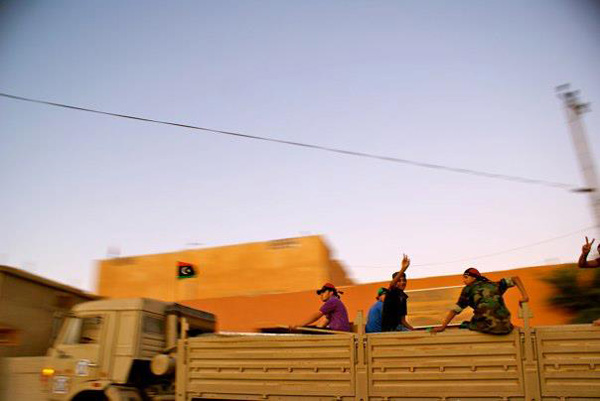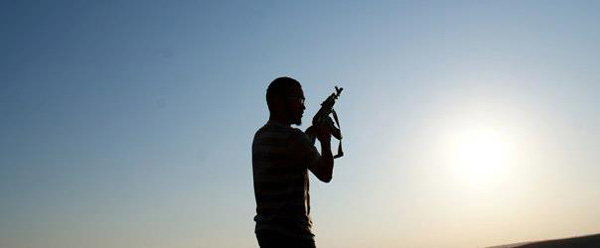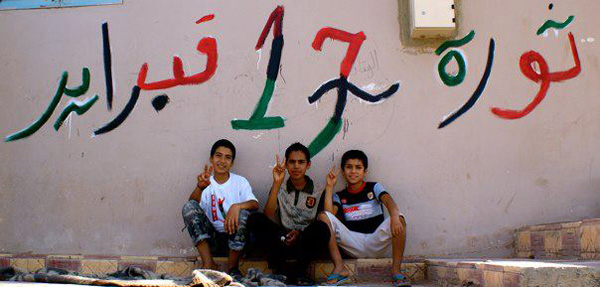
The sounds of singing, drumming, clapping and gunshots filled Martyr's Square in Tripoli on Aug. 31, as thousands of Libyans gathered to celebrate the city's liberation from loyalist forces.
This was Eid, the end of a month of fasting, that coincided with the end, too, of more than six bloody months of fighting to finish off Moammar Gaddafi's 42-year dictatorship.
Amidst the pandemonium that evening, joining in the cheers, was Sharif Ali, a 19-year-old of Libyan descent whose home is Surrey, B.C.
Ali's father was exiled from Libya by the Gaddafi regime in the 1980s, and died in Canada in 2006. A few months later, Ali visited his father's hometown of Weddan in Libya. He remembers stepping off the plane and feeling as if Big Brother was watching him. Everywhere he looked, massive posters of Gaddafi bore down on him.
There was no way to identify the secret service agents who mingled with everyone else. He once mistakenly left the house for 30 minutes without informing anyone that he was going for a drive with friends. He returned to find his host almost in tears, panicking, because he thought regime goons had abducted Ali. "The way people were," he recalled, "fear was in their heart."
Now, almost five years later, standing in Martyr's Square, Ali saw children running about waving the new Libyan flag. He saw people hugging each other, dancing, and trampling those big Gaddafi posters under their feet. Some donned Gaddafi wigs in mockery.
"I'd never felt this way. This was my first Eid outside of Vancouver, period," said Ali, who was struck that day by the sense of unity among the celebrants. Berbers, Arabs, black, white and tan, everyone seemed equal -- including the B.C. teenager who had seized an opportunity, and run some serious risks, to be on that spot. To get there, Ali had hitchhiked in five different vehicles over two days, sustained by little more than a few dates, sips of water and the kindness of strangers.
'I would either be dead or fighting'
Ali's journey into Tripoli had started weeks before in Niger, where, having flown in from Canada with his mother and brothers, he was visiting relatives.
Ali had repeatedly asked his mother if he could travel to Libya to get a first hand view of the action unfolding there. Her response was a firm "No." In Niger, he looked up flights into Tunisia anyway. The cheaper one left later that night. He booked it. When Ali's mother "woke up to my phone call, I was in another country," Ali said. "I presume she was shocked."*
He traveled from Tunis to Tataouine, where he made himself useful by distributing packets of food and cooking oil to some of the 540,000 Libyans in Tunisia who have fled over the border since the crisis began in February of this year.
In Tataouine, Ali stayed at an apartment rented by his friend who was hosting freedom fighters moving in and out of the battle zones. He swapped stories with other Libyans who had come to Tunisia to rest or organize support for the revolution.
On the phone to his mother, he begged her to give him permission to enter Libya, and, finally, she agreed. On a single condition: no fighting.
"If it wasn't for my mother, if father was alive," said Ali, "I guarantee you, I would either be dead or fighting."

Ali's uncle joined him in Tataouine and they found a car going into Zintan, the military headquarters in Libya's western mountains. His uncle, a biomedical engineer, was returning to Libya after 20 years of exile to inspect and repair hospital machines. Ali noted his uncle's silence as they drove into Zintan with the sun rising behind the mountains. He felt honoured to accompany him.
It hurt Ali to remember that his father had missed this opportunity. "His whole life he was dreaming to come back home, to come to his land to live with his family. How would my father react if this was him coming back after a very long time?"
'Sharif, my head is not straight'
In Zintan, Ali accompanied his uncle to hospitals and tried to help. There was no fighting there, but people were being brought in by ambulance from Misrata and Tripoli where clashes continued. The city was flooded with patients and Ali felt appalled at the outdated and neglected hospitals.
"I was not able to go in some of the operation rooms because of the stench alone," he recalled. In Zintan, everyone was armed because of the revolution. Kids carried 'Klashs,' the local name for Kalashnikov rifles that were taken as booty when the revolutionaries defeated loyalists. Ali saw the consequences of months of fighting. A man coming from Misrata showed him pictures of children with no limbs, children burned and deformed.
Ali left Zintan and returned to distributing food packets in Tataouine.
But he wanted to get back to Libya.
A few weeks later he did. By then the revolutionaries had taken most of the country, though loyalist pockets still existed and people were still being wounded in battle.

As Ali hitchhiked into and across Libya, he would stop at checkpoints controlled by insurgents and explain that he had come from Canada to be part of the revolution. Among the beaming fighters who welcomed him was Salem.
A 21-year-old insurgent from Zintan, Salem had broken his leg already wounded by a bullet. But he was eager to help Ali reach Tripoli. One minute Salem was crying on Ali's shoulder after learning his cousins were killed and friends captured by loyalists, the next, he was hobbling around the Zintan basecamp trying to find Ali a vehicle.
He told Ali, "Sharif, my head is not straight." But Salem persevered, and when he couldn't find a ride, he drove Ali some of the way to Tripoli himself. Said Ali, "Salem was kind, hilarious, and very, very pure hearted."
They drove in the dead of the night, dodging huge dirt piles dug up to slow down traffic at checkpoints. After hitting one of the mounds, they came to a halt. Shaken but sound, they brushed off the dirt and continued. When they reached Yefren, Salem gave Ali a small bottle of perfume. Ali was moved to tears when they parted ways.
Ali met his friend from Tataouine, who showed him around the city, pointing out buildings damaged by missiles from Gaddafi's forces. Just two hours away, Tripoli lay within reach. Ali found a new ride to take him there, and arrived just in time for the evening prayers and the mass celebration in Martyr's Square.*
'Restless' in Surrey
Today Ali is back in Surrey, selling shoes at Footlocker during the semester off from his political science degree at Kwantlen Polytechnic.
It was from the suburban remove of Surrey that he had watched the Arab Spring unfold, and had yearned to be part of it.
Ali said his "restlessness" began early, when news of the Tunisian revolution broke and then Egypt rose against Hosni Mubarak's dictatorship.
Twitter and Facebook began to buzz with Libyans all over the world, who were planning a similar destiny for their country. Ali joined the conversation. "People were waiting for it, we were just waiting for it," he said. He maintained that the people who fueled Libya's revolution were intellectuals. They had studied, and they had traveled. Most had been outside Libya and seen what it felt like to have a breath of freedom. Himself included.
During the spring and summer, Ali had marched at rallies and raised money. His west coast friends supported him as he shaved his afro to make $2,000 for the Libyan Relief Fund.
Ali's stage name when he performs slam poetry is "El Weddani" or 'one from Weddan,' where NATO is still destroying military equipment. Months ago, when the revolution was gaining momentum, Ali responded from home in Canada through poems. He wrote about the 1996 Abu Salim Prison Massacre, in which 1,200 prisoners died and no officials were held accountable by the Gaddafi regime. He wrote another poem dedicated to the independent journalist Mohammed Nabbous, who was shot by a sniper as he reported on the 2011 revolution.

'I am a Canadian first'
Sitting at a table in a Surrey Tim Horton's, Ali said that he is more of a Malcolm X than a Martin Luther King. He will not forgive the fact that more than 30,000 people died in the fight to wrest control of Libya from a dictatorship he considers to have been brutal in the extreme. "The only way to end the nightmare is by cutting the head of the snake." Ali said. He considers Gaddafi loyalists to be brainwashed mercenaries or hypocrites.
He has heard arguments against the NATO-imposed no-fly zones, Canadians saying that the conflict was none of their business and that Libyans should be left to fend for themselves.
"I understand this, said Ali. "I am a Canadian first and Canada is my home. But if your tax dollars are going towards NATO to save thousands of lives and you cannot give that up, I am sorry for you."
Had Canada and other NATO countries not imposed the no-fly zone, believes Ali, Gaddafi would have taken advantage of the opportunity to slaughter tens of thousands more people in regions of Libya his opponents had made their strongholds.
Ali said that he did not care whether NATO was serving their own interests, whether they wanted Libya's oil or reconstruction contracts. "Take all the oil you want, take all our money. This was not a bread and water revolution. All we want is freedom."
[See more Tyee political coverage.]
Story updated 09/23/11 at 2:35 p.m. ![]()
Read more: Politics














Tyee Commenting Guidelines
Comments that violate guidelines risk being deleted, and violations may result in a temporary or permanent user ban. Maintain the spirit of good conversation to stay in the discussion.
*Please note The Tyee is not a forum for spreading misinformation about COVID-19, denying its existence or minimizing its risk to public health.
Do:
Do not: